Top ball valve and gate valve in China introduce,list main products and website if have
In China, some of the top ball valve manufacturers include Guangyi Valve Group Co., Ltd., Zhejiang Zhonggong Valve Group Co., Ltd., and Tianjin Tanggu Jinbin Valve Co., Ltd. These companies produce a wide range of ball valves, including floating ball valves, trunnion mounted ball valves, and fully welded ball valves. Guangyi Valve Group Co., Ltd. (www.gy-valve.com) is a leading manufacturer of industrial valves with a focus on precision engineering and quality control. Their main products include ball valves, gate valves, globe valves, check valves, and butterfly valves. Zhejiang Zhonggong Valve Group Co., Ltd. (www.zjvalve.com) offers a variety of ball valves suitable for various applications, including oil and gas, petrochemical, and water treatment industries. Tianjin Tanggu Jinbin Valve Co., Ltd. (www.jinbinvalve.com) specializes in producing high-quality ball valves made from materials such as stainless steel, carbon steel, and alloy steel.
As for gate valves, some of the top manufacturers in China include Wenzhou Kerui Valve Industry Co., Ltd., Zhejiang Yuhuan Fengfan Valve Co., Ltd., and Zhejiang Yaang Pipe Industry Co., Limited. Wenzhou Kerui Valve Industry Co., Ltd. (www.keruivalve.com) is known for its wide range of gate valves, including wedge gate valves, knife gate valves, and slab gate valves. Zhejiang Yuhuan Fengfan Valve Co., Ltd. (www.fengfanvalve.com) specializes in manufacturing gate valves for applications in the oil and gas, petrochemical, and water industries. Zhejiang Yaang Pipe Industry Co., Limited (www.yaang.com) offers a variety of gate valves made from high-quality materials such as stainless steel, carbon steel, and alloy steel.
Overall, China is home to several top manufacturers of ball and gate valves, offering a wide range of products suitable for various industries and applications.
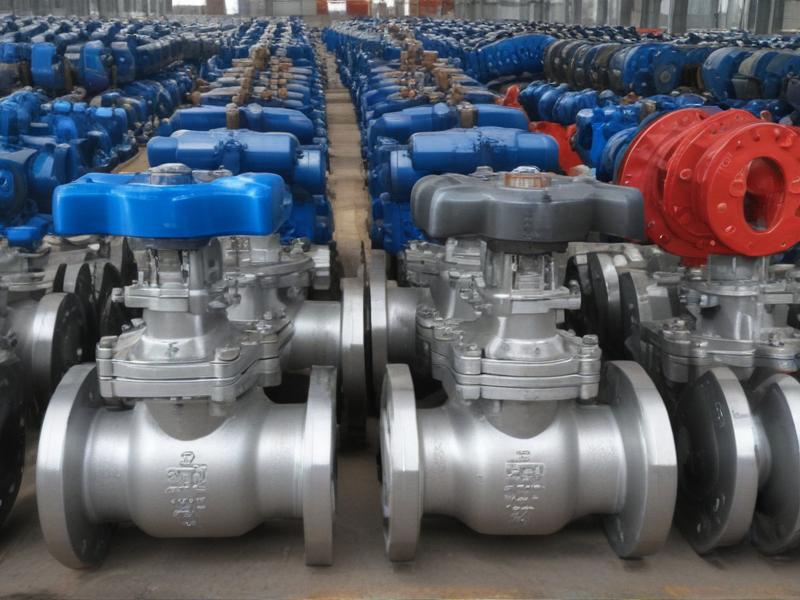
Types of ball valve and gate valve
Ball valves are commonly classified into three types: floating ball valves, trunnion-mounted ball valves, and fully welded ball valves.
Floating ball valves are the most common type of ball valve and are characterized by a free-floating ball that moves to create a seal against the valve seat. These valves are suitable for low to medium pressure applications and are easy to operate.
Trunnion-mounted ball valves feature a fixed ball that is supported by trunnions, which ensure proper alignment and reduce the risk of ball shifting under high pressures. These valves are ideal for high-pressure and high-temperature applications.
Fully welded ball valves are designed with a single-piece body, eliminating potential leakage points and enhancing the valve’s strength and durability. These valves are often used in critical applications where safety and reliability are paramount.
Gate valves are commonly classified into parallel slide gate valves, wedge gate valves, and knife gate valves.
Parallel slide gate valves have two parallel seats that move away from each other to open the valve, providing a tight seal in both directions. These valves are commonly used in high-pressure applications.
Wedge gate valves feature a wedge-shaped gate that is pushed against the seats to create a seal. These valves are suitable for high-temperature applications and are available in different configurations such as solid wedge, flexible wedge, and split wedge.
Knife gate valves have a sharp-edged gate that cuts through the flow of fluids and solids, making them ideal for handling viscous media, slurries, and high-consistency pulp. These valves are commonly used in industries such as mining, wastewater treatment, and pulp and paper.
Overall, both ball valves and gate valves offer different advantages and are suited for various applications based on their design and capabilities. It is essential to choose the right type of valve based on the specific requirements of your system to ensure optimal performance and reliability.
Pros and Cons of Using ball valve and gate valve
Ball valves are known for their simple design, ease of operation, and relatively low maintenance requirements. They provide excellent shutoff capabilities and are suitable for a wide range of applications, from residential plumbing to industrial processes. Ball valves are also able to provide quick, quarter-turn operation, allowing for efficient control of flow. However, ball valves may be prone to leakage when partially open, as the ball can wear down over time.
Gate valves, on the other hand, are better at providing a tight seal and preventing leakage, even when partially open. They are ideal for applications where a tight shutoff is required, such as in water distribution systems. However, gate valves are more complex in design and can be more difficult to operate compared to ball valves. They also require more frequent maintenance to prevent corrosion and ensure smooth operation.
In summary, ball valves offer simplicity, ease of operation, and versatility, but may be prone to leakage when partially open. Gate valves provide a tight seal and are suitable for applications where shutoff capabilities are critical, but they are more complex and require more maintenance. Ultimately, the choice between ball valves and gate valves depends on the specific requirements of the application and the desired level of maintenance and control.
ball valve and gate valve Reference Specifications (varies for different product)
A ball valve is a quarter-turn valve used to control the flow of liquids or gases through a pipe. It consists of a hollow, perforated, and pivoting ball that is used to control the flow through it. The ball has a hole or port in the middle that allows fluid to pass through when the valve is in the open position. When the valve is in the closed position, the ball is rotated to block the flow of fluid.
Some common reference specifications for ball valves include ANSI/ASME B16.34 for pressure-temperature ratings, API 6D for pipeline valves, and API 608 for metal ball valves. Ball valves are available in various materials such as stainless steel, brass, and PVC, and can be used in a wide range of applications including industrial, commercial, and residential plumbing systems.
A gate valve is a linear motion valve used to control the flow of fluids through a pipe. It consists of a gate or wedge-shaped disc that is raised or lowered to control the flow of fluid. When the valve is in the open position, the gate is lifted to allow fluid to pass through. When the valve is in the closed position, the gate is lowered to block the flow of fluid.
Some common reference specifications for gate valves include API 600 for steel valves, API 603 for corrosion-resistant valves, and API 602 for compact steel gate valves. Gate valves are available in various materials such as carbon steel, cast iron, and stainless steel, and are commonly used in applications requiring a tight shutoff such as water treatment plants, power plants, and oil and gas refineries.
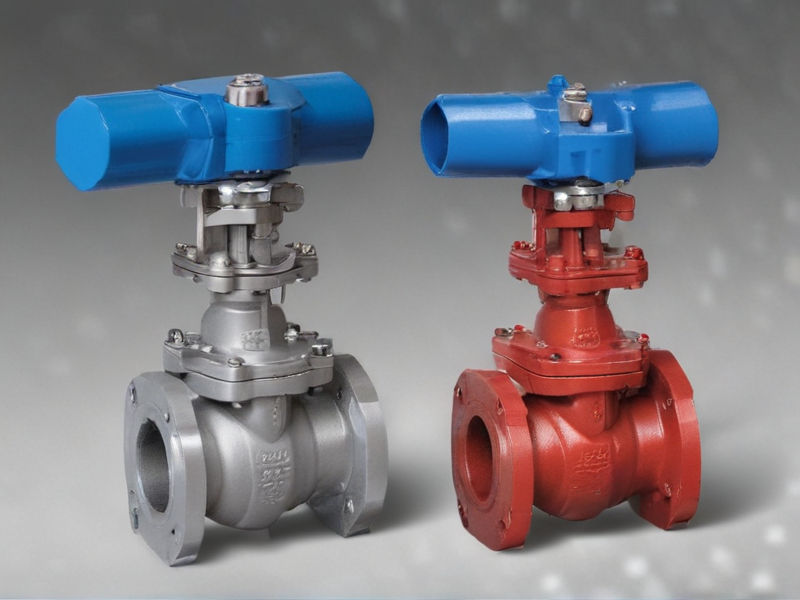
Applications of ball valve and gate valve
Ball valves are typically used in applications where a tight shut-off is required. This type of valve is often used in industrial settings where the flow needs to be fully shut off for maintenance or emergencies. Ball valves are also commonly used in residential plumbing systems for their durability and ease of use.
Gate valves, on the other hand, are often preferred for applications where a straight-line flow of fluid is required. These valves are commonly used in the oil and gas industry, as well as in water treatment plants. Gate valves are able to provide a tight seal and are often used in high-pressure applications where a reliable shut-off is essential.
Both ball valves and gate valves have their own advantages and disadvantages. Ball valves are typically easier to operate and require less maintenance than gate valves. However, ball valves can be more prone to leakage over time. Gate valves are generally more durable and provide a tighter seal, but they can be more difficult to operate and may require more frequent maintenance.
Overall, the choice between a ball valve and a gate valve will depend on the specific requirements of the application. Both types of valves have their own unique strengths and weaknesses, and it is important to carefully consider these factors when selecting the right valve for a particular application.
Material of ball valve and gate valve
Ball valves are typically made from metal, such as stainless steel, brass, or bronze, as well as PVC and other durable plastics. Stainless steel is a common material choice for ball valves due to its corrosion resistance, durability, and high temperature resistance. Brass and bronze are also popular choices for their resistance to corrosion and long service life. PVC ball valves are commonly used in applications where corrosion resistance and chemical compatibility are important factors.
Gate valves are also commonly made from metal materials, including cast iron, stainless steel, and brass. Cast iron gate valves are known for their strength and durability, making them ideal for high-pressure applications. Stainless steel gate valves offer similar benefits, as well as excellent corrosion resistance. Brass gate valves are often chosen for their affordability and good performance in low to medium pressure applications.
Overall, both ball valves and gate valves are available in a variety of different materials to suit different applications and environments. When selecting a valve, it is important to consider factors such as the type of media being controlled, the pressure and temperature requirements, and any chemical compatibility concerns. By choosing the right material for the valve, you can ensure proper performance and long-term reliability in your system.
Quality Testing Methods for ball valve and gate valve and how to control the quality
Quality testing methods for ball valves and gate valves include the following:
1. Visual inspection – visually checking the valves for any defects or irregularities such as cracks, corrosion, or damage to the surface finish.
2. Dimensional inspection – verifying the dimensions of the valves to ensure they meet the specifications outlined in the design.
3. Pressure testing – subjecting the valves to pressure tests to ensure they can withstand the specified pressure levels without leaking or failing.
4. Leakage testing – checking for any leakage in the valves by pressurizing them and examining for any leaks.
5. Material analysis – conducting material tests to ensure the valves are made of the appropriate materials and comply with industry standards.
To control the quality of ball valves and gate valves, manufacturers can implement the following measures:
1. Establishing quality control processes – implementing quality control processes to ensure that each valve undergoes the necessary inspections and testing before being released to the market.
2. Training employees – providing training to employees on quality control procedures and ensuring they understand the importance of maintaining high-quality standards.
3. Regular audits – conducting regular audits of the manufacturing processes to identify any potential issues and take corrective actions.
4. Using quality materials – sourcing high-quality materials for the production of valves to ensure durability and reliability.
By following these quality testing methods and implementing quality control measures, manufacturers can ensure that ball valves and gate valves meet the required quality standards and are safe for use in various applications.
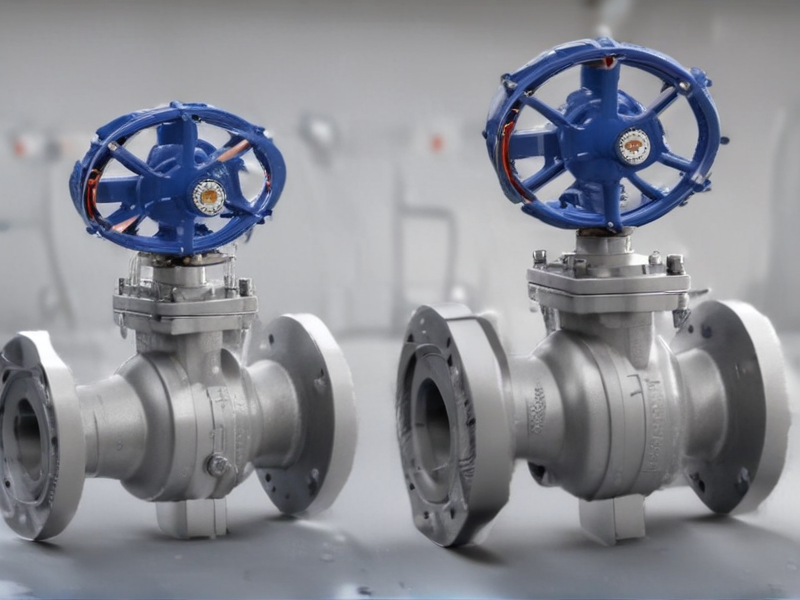
The Work Process and how to use ball valve and gate valve
The work process of ball valves and gate valves involve controlling the flow of liquids or gases in a piping system.
Ball valves are quarter-turn valves that use a spherical disc to regulate the flow. They are ideal for on/off operation and are commonly used in applications where tight shut-off is required. To use a ball valve, simply turn the lever handle 90 degrees to either open or close the valve.
Gate valves, on the other hand, use a gate or wedge-shaped disc to control the flow of fluids. They are designed for full flow with minimal pressure drop. To use a gate valve, turn the wheel handle in a clockwise direction to close the valve, and counterclockwise to open it.
When using ball valves and gate valves, it is important to ensure they are installed correctly and are in good working condition. Regular maintenance and inspection are essential to prevent leaks and ensure optimal performance.
In summary, ball valves are best for on/off control, while gate valves are ideal for full flow regulation. Both valves offer reliable performance when used properly, making them essential components in a variety of industries.
ball valve and gate valve Importing questions including Cost,Supplier,Sample,Certification and Market
1. Cost: When importing ball valves and gate valves, the cost will vary depending on factors such as the type, size, material, and quality of the valves. It is important to compare prices from different suppliers to ensure you are getting the best deal. Additionally, consider other costs such as shipping, customs duties, and taxes when calculating the total cost.
2. Supplier: It is crucial to find a reliable and reputable supplier when importing ball valves and gate valves. Look for suppliers who have a proven track record of delivering high-quality products on time. Consider factors such as their production capacity, quality control processes, and experience in exporting to your country.
3. Sample: Before placing a bulk order, it is advisable to request samples from potential suppliers to evaluate the quality of the valves. This will give you a better idea of the materials used, construction, and performance of the valves. Ensure that the samples meet your specifications before proceeding with the order.
4. Certification: Check if the ball valves and gate valves you are importing are certified by relevant authorities such as ISO, API, or CE. Certification ensures that the valves meet industry standards for quality and safety. This can also help you avoid potential issues with customs and regulatory agencies in your country.
5. Market: Before importing ball valves and gate valves, research the market demand and competition in your country. Understand the potential target customers, distribution channels, and pricing strategies to ensure a successful market entry. Consider factors such as market trends, regulations, and industry standards to effectively position your products.
Overall, thorough research, careful supplier selection, and attention to quality and certification are essential when importing ball valves and gate valves. By considering these factors, you can streamline the importing process and ensure a successful entry into the market.
How to find and select check reliable ball valve and gate valve manufacturers in China
To find and select reliable ball valve and gate valve manufacturers in China, start by researching online directories, trade shows, and industry associations that specialize in valve manufacturers. Look for companies with a good reputation, proper certifications, and a history of successful projects.
Next, carefully review each manufacturer’s website and product catalogs to ensure they offer the specific type and size of valves you need. Pay attention to the company’s experience in the industry, quality control processes, and compliance with international standards such as ISO, API, and ANSI.
Reach out to multiple manufacturers to request quotes and samples of their products. Ask about their production capacity, lead times, and customization options. Engage in thorough discussions with their sales representatives to gauge their communication skills and technical knowledge.
Check for customer reviews and testimonials to get a sense of the manufacturer’s track record and customer satisfaction. Ask for references and contact previous clients to gather first-hand feedback on their experience with the manufacturer.
Finally, conduct an on-site visit or virtual factory tour to assess the manufacturer’s facilities, production processes, and quality control measures. Make sure they have the necessary equipment and infrastructure to meet your requirements.
By following these steps and evaluating each manufacturer based on their capabilities, reputation, and quality standards, you will be able to select a reliable ball valve and gate valve manufacturer in China that meets your specific needs.
Background Research for ball valve and gate valve manufacturers Companies in China, use qcc.com archive.org importyeti.com
Ball valve and gate valve manufacturers in China can be found on platforms such as qcc.com, archive.org, and importyeti.com. These platforms provide valuable information on various companies in the industry, including their products, certifications, and contact details.
Some popular ball valve manufacturers in China include companies like Shanghai Duicheng Industrial Co., Ltd, Zhejiang Dadongwu Valve Co., Ltd, and Zhejiang Wenbao Valve Technology Co., Ltd. These companies are known for their high-quality products and strict adherence to international standards.
On the other hand, gate valve manufacturers in China such as Zhejiang HuaXia Valve Co., Ltd, Suzhou Dofly M&E Technology Co., Ltd, and Tianjin Exxon Valve Co., Ltd are also well-reputed for their durable and reliable products. These companies offer a wide range of gate valves suitable for various industrial applications.
It is important to conduct thorough research and due diligence before partnering with any manufacturer in China to ensure the quality, reliability, and compliance of their products. These platforms mentioned can provide valuable insights and information to help businesses make informed decisions when sourcing ball valves and gate valves from manufacturers in China.
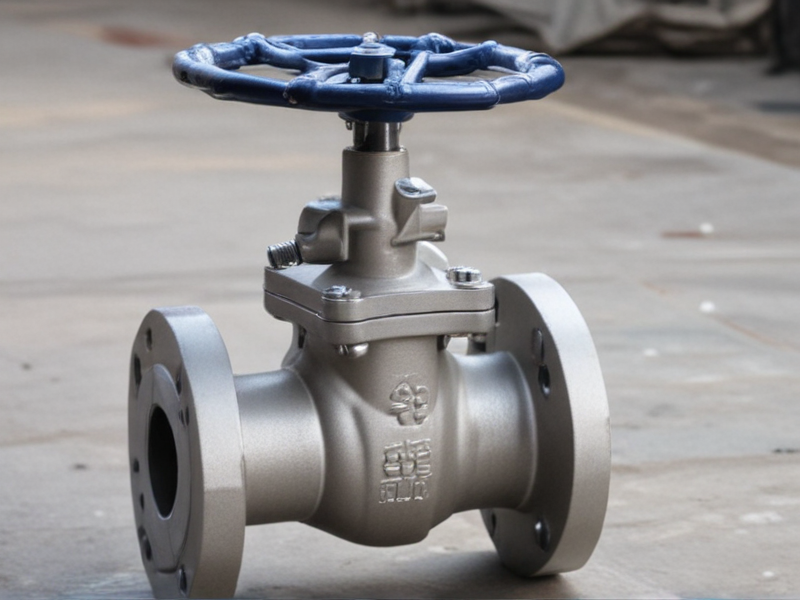
Price Cost Research for ball valve and gate valve manufacturers Companies in China, use temu.com and 1688.com
When researching ball valve and gate valve manufacturers in China, two popular websites to consider are temu.com and 1688.com. These platforms offer a wide range of suppliers and manufacturers, making it easy to compare prices and costs.
To start your research, simply enter keywords such as “ball valve manufacturer” or “gate valve manufacturer” into the search bar on both websites. You can then browse through the list of suppliers that appear, looking for those that meet your specific requirements in terms of product quality, quantity, and pricing.
It is recommended to contact multiple manufacturers to request quotes and gather information on their pricing, MOQ (Minimum Order Quantity), lead times, and shipping costs. Keep in mind that prices may vary depending on the material, size, and customization options of the valves.
Additionally, be sure to evaluate each manufacturer’s reputation and track record by reading reviews and feedback from other buyers.
By utilizing temu.com and 1688.com to research ball valve and gate valve manufacturers in China, you can gather valuable information to help you make an informed decision on which supplier to choose based on your specific needs and budget.
Shipping Cost for ball valve and gate valve import from China
When importing ball valves and gate valves from China, the shipping cost will depend on several factors such as the weight and dimensions of the products, the shipping method chosen, the shipping distance, and any additional services required.
For smaller orders or samples, air freight is often the fastest but also the most expensive option. The cost of air freight for ball valves and gate valves can range from $5 to $10 per kilogram, with a minimum charge of around $100. This cost may increase for larger or heavier shipments.
For larger orders, sea freight is usually more cost-effective. The cost of sea freight for ball valves and gate valves typically ranges from $500 to $1500 per container, depending on the size and weight of the shipment, as well as the shipping distance.
In addition to the shipping cost, there may be additional charges such as customs duties, import taxes, and handling fees. These charges can vary depending on the country of import and the value of the goods being imported.
It is important to work closely with a reputable freight forwarder or shipping company to get an accurate quote for the shipping cost of importing ball valves and gate valves from China. They can help you navigate the complexities of international shipping, handle customs clearance, and ensure your products arrive safely and on time.
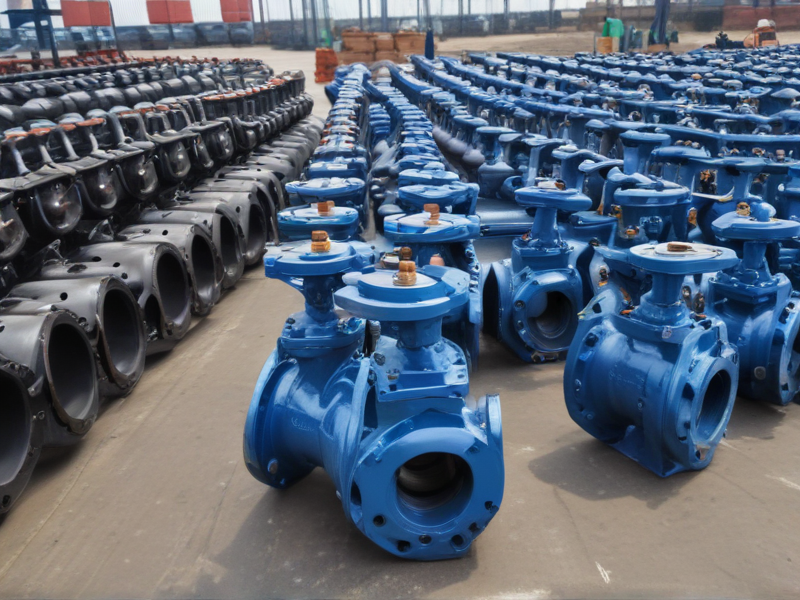
Compare China and Other ball valve and gate valve Markets: Products Quality and Price,Visible and Hidden Costs
China is known for its mass production of ball valves and gate valves, offering a wide range of products at competitive prices. However, the quality of these valves can vary significantly compared to other markets. While some Chinese manufacturers produce high-quality valves that meet international standards, others may cut corners to reduce costs, resulting in lower-quality products that may not perform as well or have a shorter lifespan.
In terms of price, China’s market tends to offer more affordable options compared to other markets such as Europe or the United States. This can be attributed to lower labor and production costs in China, allowing manufacturers to offer their products at a lower price point. However, buyers should be aware of hidden costs such as shipping, customs duties, and potential quality control issues that may arise when sourcing valves from China.
Overall, buyers should carefully evaluate the quality and price of ball valves and gate valves from China compared to other markets. While China may offer cost-effective options, buyers should be cautious of potential quality concerns and hidden costs that could impact the overall value of their purchase. It is important to conduct thorough research and consider factors such as certifications, reviews, and supplier reputation when sourcing valves to ensure they meet the necessary quality standards.
Custom Private Labeling and Branding Opportunities with Chinese ball valve and gate valve Manufacturers
Chinese ball valve and gate valve manufacturers are known for their high-quality products at competitive prices. Many of these manufacturers offer custom private labeling and branding opportunities for clients looking to establish their own brand in the market.
By working with Chinese manufacturers, you can customize the design, packaging, and branding of ball valves and gate valves to suit your company’s requirements. This allows you to create a unique product that stands out from the competition and strengthens your brand identity.
Private labeling and branding also provide a marketing advantage by allowing you to create a consistent look and feel across all your products. This helps build brand recognition and loyalty among customers, leading to increased sales and brand reputation.
Moreover, Chinese manufacturers have the expertise and experience to help you navigate the complexities of private labeling and branding. They can provide valuable insights and advice on design, material selection, and production processes to ensure that your products meet industry standards and regulations.
Overall, partnering with Chinese ball valve and gate valve manufacturers for custom private labeling and branding opportunities can help you differentiate your products in the market and build a strong brand presence. It is a cost-effective way to enhance your product offerings and establish your brand as a reliable and trusted supplier in the industry.
Tips for Procurement and Considerations when Purchasing ball valve and gate valve
When purchasing ball valves and gate valves for procurement, there are several key considerations to keep in mind. Here are some tips to help guide you through the process:
1. Know the application: Understand the specific usage and environmental conditions in which the valves will be operating. This will help determine the right type of valve needed for the job.
2. Quality and reliability: Choose valves from reputable manufacturers known for producing high-quality valves that are durable and reliable. Look for certifications or approvals from industry standards organizations.
3. Size and pressure rating: Ensure that the valves you select are the correct size and have the appropriate pressure rating for the intended application. It is crucial to match the valves to the flow rate and pressure requirements.
4. Material construction: Consider the material construction of the valves based on the type of media being handled. Stainless steel, brass, and PVC are common materials used for valves with different chemical compatibility and temperature resistance.
5. Valve type: Decide between ball valves and gate valves based on the specific needs of the system. Ball valves offer quick operation and tight shut-off, while gate valves provide better flow control and can handle higher pressure applications.
6. Budget: Set a budget for procurement and choose valves that offer the best value for money without compromising on quality and performance.
7. Maintenance and serviceability: Consider how easy it is to maintain and service the valves. Look for valves with accessible components for easy repair and maintenance.
By taking these factors into account, you can ensure that the ball valves and gate valves you purchase meet the requirements of your system and provide reliable performance. It is essential to work with trusted suppliers and manufacturers to guarantee the quality and authenticity of the valves purchased.
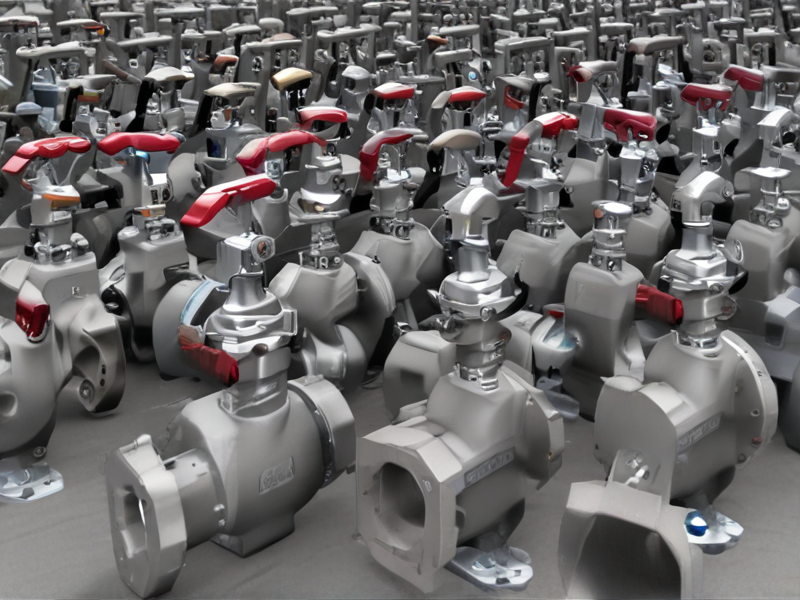
FAQs on Sourcing and Manufacturing ball valve and gate valve in China
1. How can I find a reliable manufacturer for ball valves and gate valves in China?
You can search for manufacturers through online platforms like Alibaba, Global Sources, or Made-in-China. Verify their certifications and conduct thorough research on their reputation and track record. It is recommended to visit the manufacturer’s facility in person or hire a third-party inspection agency to ensure product quality.
2. What are the common materials used for manufacturing ball valves and gate valves in China?
Common materials used for ball valves and gate valves in China include stainless steel, carbon steel, brass, and cast iron. The choice of material depends on factors like the type of application, pressure rating, and corrosion resistance requirements.
3. Can I customize the design of ball valves and gate valves when sourcing from manufacturers in China?
Yes, many manufacturers in China offer customization services for ball valves and gate valves. You can work closely with the manufacturer to design the product according to your specific requirements, including size, material, pressure rating, and end connections.
4. Are there any quality control procedures in place for ball valves and gate valves manufactured in China?
Yes, reputable manufacturers in China follow strict quality control procedures to ensure the products meet international standards. This may include raw material inspections, in-process inspections, and final product testing before shipment. It is essential to inquire about the manufacturer’s quality control process before placing an order.
5. How can I ensure compliance with relevant regulations and certifications when sourcing ball valves and gate valves from China?
Ensure that the manufacturer holds necessary certifications such as ISO 9001, CE, and API. Request compliance documentation and test reports to confirm that the products meet industry standards. You may also consider hiring a third-party inspection agency to verify compliance with regulations.
Why contact sourcifychina.com get free quota from reliable ball valve and gate valve suppliers?
Sourcifychina.com offers a convenient platform for businesses to connect with reliable suppliers of ball valve and gate valve products in China. By contacting Sourcify China, businesses can easily obtain a free quota from trusted suppliers, allowing them to compare prices and quality before making a purchasing decision.
Working with reputable suppliers ensures that businesses receive high-quality products that meet their specific requirements. The suppliers listed on Sourcify China have been vetted for their reliability, reputation, and product quality, giving businesses the assurance that they are dealing with trustworthy partners.
By obtaining a free quota from multiple suppliers, businesses can effectively compare pricing, lead times, and other important factors to make an informed decision. This helps businesses secure the best possible deal while ensuring that they are working with suppliers that can meet their needs in terms of quality and quantity.
Overall, contacting Sourcify China to get a free quota from reliable ball valve and gate valve suppliers is a smart decision for businesses looking to streamline their sourcing process and connect with top-notch suppliers in the industry. This service saves time and effort while delivering peace of mind that businesses are getting the best value for their money.
